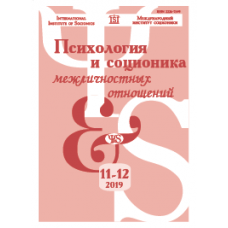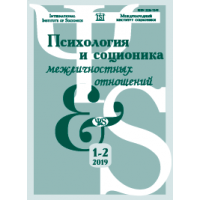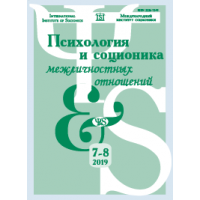Номер № 11-12/2019 журналу «Психологія та соціоніка міжособових відношень»
Питання освіти
Чикирисова Г.В., Карпенко О.Б., Букалов А. В.
Соціонічні технології в школі
Методи соціоніки —, теорії інформаційної структури психіки та інтертипних відносин — , педагогіка, психологія, відносини, успішність, взаємодія вчитель-учень.
Соціоніка в дитячій
Звонарьова Н.А.
Розвиток уяви у дітей дошкільного віку різних ТІМів
Розглянуто питання розвитку уяви у дітей дошкільного віку з позиції різного типу інформації. Наведено приклади занять.
Ключові слова: соціоніка, діти, уява, розвиток, практичні заняття.
Інтертипні відносини
Строганов В.В.
Про деякі складнощі у відносинах активації
Проведено аналіз інтертипних відносин активації з використанням недоповнюючих та конфліктогенних ознак Мета дослідження – показати негативні моменти, на які варто звернути увагу, спілкуючись з активатором. будь-якій людині, яка зацікавлена у побудові гармонійних відносин.
Ключові слова: соціоніка, інтертипні відносини, активація, IL (ІЛЕ), ES (ЕСЕ).
Ріга А., Педан Т.П.
Чому не завжди спрацьовують дуальні відносини
Аналіз причин незадоволеності дуальних партнерів та рекомендації щодо гармонізації відносин.
Ключові слова: дуальність, соціоніка, особистість, психіка, самодуалізація , самодостатність, самовдосконалення, відносини, ТИМ, субособистість, квадра.
Трофімова А.А.
Аналіз ситуації виховання дитини під замовленням та під контролем батьків
Проведено аналіз взаємовідносин між членами сім'ї, розглянуто вплив дуальної батьківської пари на формування соціонічної маски» ;розібрані труднощі діагностики та самодіагностики в такій ситуації.
Ключові слова: соціонічний тип, квадральні цінності, інтертипні відносини.
Практична соціоніка
Прокоф'єв В.Г., Рязанцева Є.А.
Діагностика соціонічного типу шляхом контент-аналізу інформаційних аспектів
Представлено результати проведеного дослідження підходу до діагностики соціонічного типу методом безпосереднього контент-аналізу текстів піддослідних. Отримано обнадійливі результати та сформульовано завдання щодо подальшого розвитку та вдосконалення методики.
Ключові слова: соціоніка, контент-аналіз, інформаційний аспект, семантика.
Методи соціоніки
Гуров С.А.
Про назви соціонічних малих груп &m;h; називання соціонічних малих груп «груп сприйняття», обґрунтовує пропоновані назви.
Ключові слова: соціоніка, групи сприйняття, групи перцепції, групи встановлення сприйняття, пунктуали, креатори, гедоністи, педанти, ґрунтовні, гнучкі, сприйнятливі, ґрунтовні, дистрибутивні, комутативні, дисоціативні, асоціативні, похід, Математичні методи в соціоніці
Мінаєв Ю.П., Даценко І.П., Джойнтон Е.
23 з 217 можливих тетрахотомій, які ділять безліч з 16 типів на чотири &lquo;однорідних» чотири типи в кожному
Ця стаття є двадцять першою в серії публікацій, посвячених дидактиці математичних методів соціоніки. З усього безлічі 217 можливих тетрахотомій соціону на однорідні четвірки типів ми розглядаємо тільки 23 елементне підмножина, що входять до цього підмножини. класичних інтертипних відносин. Лише ці 23 тетрахотомії із зазначеної множини можуть бути організовані з використанням дихотомій, вербалізованих ознаками Аугустинавічюте “Рейніна та Юнга” Мінаєва.
відносини, математичні методи, група, підгрупа, бінарна операція, суміжні класи, група операторів класичних інтертипних відносин, дихотомії соціону, тетрахотомії соціону, групи біполярних ознак типів, Аугустинавічюте – Рейніна ознаки (АРПи), Юнга – Мінаєва ознаки (ЮМПи). >Дискусії
Мегедь В.В.
Місія етика в суспільстві
Описано соціальну місію етичного типу особистості та прояви її в житті суспільства. Що таке третя функція в психософіі? Чи впливає третя Воля на модель А? приклади, розберемо вплив третьої Волі на горизонтальні блоки моделі А, розповімо про надконтроль третьої Волі.
Ключові слова:< /em> соціоніка, етичний тип особистості, логіка, етика. І.П., Цигенов А.В. Функція Волі в психософії та робота моделі А в соціоніці
Ключові слова: соціоніка, психософія, третя Воля, суперпроцес, суперрезультат, горизонтальні блоки ВД, ЕГО, Модель А.Від першої особи
Надєдинська В.
«Єсенін»Жуков»? > (СЛЕ, «Жуків») та TE (ІЕІ, «Єсенін»), відмінності та подібність між ними на основі Моделі А, ознак Аугустинавічюте-Рейніна та малих груп. "soc">FL) у повсякденному житті.
Ключові слова: соціоніка, дихотомії, модель А, ознаки Аугустинавічюте& Рейніна, малі групи, FL (СЛЕ), TE (ІЕІ).
Наприкінці номера
Криво Н.Є.
Флакон
Психологія та соціоніка 11-12/2019
- Модель: выпуск журнала «Психология и соционика…»
-
$3.00
- Ціна в бонусних бали: 30
Рекомендовані товари
Психологія та соціоніка 1-2/2019
Номер № 1-2/2019 журналу «Психологія та соціоніка міжособових відношень» Психологія та ф..
$3.00
Психологія та соціоніка 3-4/2019
Номер № 3-4/2019 журналу «Психологія та соціоніка міжособових відношень» Математичні мет..
$3.00
Психологія та соціоніка 5-6/2019
Номер № 5-6/2019 журналу «Психологія та соціоніка міжособових відношень» Соціоніка та ви..
$3.00
Психологія та соціоніка 7-8/2019
Номер № 7-8/2019 журналу «Психологія та соціоніка міжособових відношень» Дослідження Ков..
$3.00
Психологія та соціоніка 9-10/2019
Номер № 9-10/2019 журналу «Психологія та соціоніка міжособових відношень» Питання освіти..
$3.00






